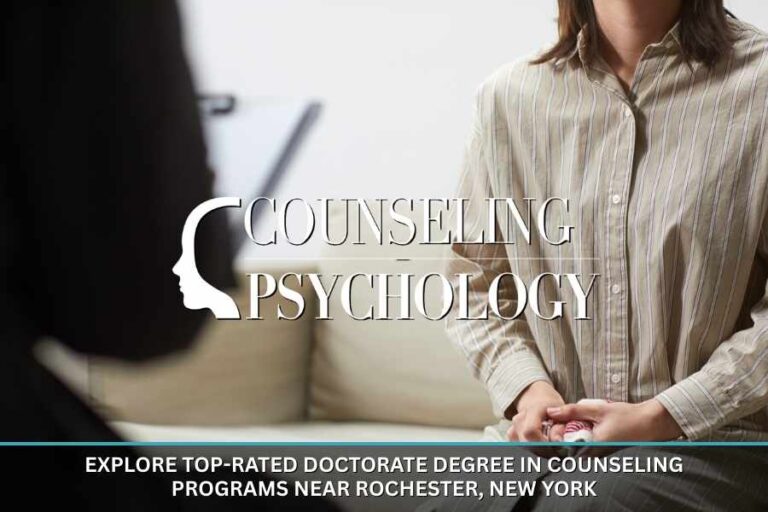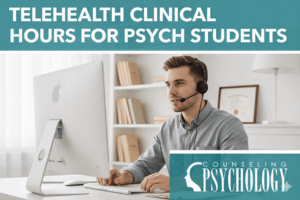Discover Top-Rated Doctorate Degree in Counseling Programs Near Rochester, New York

Rochester, New York, has become a center of opportunity for individuals pursuing advanced counseling education. With a tradition of academic innovation and a growing need for mental health professionals, the city offers an environment where aspiring leaders in counseling can thrive. According to the National Alliance on Mental Illness, more than one in five adults in the United States experiences a mental illness each year, highlighting the pressing need for highly trained professionals who can lead, research, and innovate. Doctoral programs in counseling provide that pathway, preparing graduates for impactful careers that combine clinical expertise with leadership and scholarship.
2026 Explore Top-Rated Doctorate Degree in Counseling Programs Near Rochester, NY
University of Rochester
Rochester, NY - Private 4-year - rochester.edu
Doctorate - PhD in Counseling (School Counseling)
Campus Based - Visit Website
The University of Rochester's PhD in Counseling with a School Counseling concentration is a CACREP-accredited, campus-based program designed for professionals aiming to advance in educational mental health. It emphasizes leadership in school settings, focusing on student support and intervention strategies, with a 90% completion rate and 82% job placement. An entrance exam, such as the GRE, is required for admission.
- CACREP Accredited Counseling Program
- 90% Program Completion Rate
- 82% Job Placement Rate
- Doctoral Level School Counseling
- Comprehensive Professional Preparation
Why Pursue a Doctorate in Counseling?
Doctoral-level counseling degrees equip professionals with the skills to advance beyond direct practice into roles that shape the counseling profession. Graduates are prepared for positions in research, higher education, clinical supervision, and policy development. A doctorate also expands opportunities for specialization in areas such as trauma recovery, multicultural counseling, or child and adolescent mental health. In communities like Rochester, these specialized skills address complex challenges and support long term growth in mental health services.
Counseling Needs in the Rochester Region
Rochester faces unique community needs that call for advanced professional preparation. Monroe County reports consistent increases in demand for counseling services among adolescents and young adults, particularly related to anxiety, depression, and substance use. Local nonprofits and healthcare providers continue to emphasize culturally responsive and trauma care, ensuring that individuals from diverse backgrounds receive support tailored to their experiences. Doctoral graduates trained in these approaches can contribute directly to community wellness initiatives.
Comparing Ph.D. and Ed.D. Counseling Programs
Understanding the differences between a Ph.D. and Ed.D. in counseling helps students align education with career goals. The following table highlights key distinctions:
| Feature | Ph.D. in Counseling | Ed.D. in Counseling |
| Focus | Research, data analysis, theory development | Leadership, applied practice, program management |
| Ideal Career Path | University faculty, research director, clinical supervisor | School system leader, nonprofit executive, healthcare administrator |
| Dissertation | Emphasis on original research | Focus on applied project addressing real world problems |
| Outcome | Prepares graduates for academic scholarship and advanced licensure | Prepares graduates for leadership in applied settings |
Both degree paths can lead to advanced practice and leadership, but the choice depends on whether the student seeks to focus more on research or on applied organizational change.
Licensure Considerations in New York State
Doctoral counseling programs often prepare students for licensure as mental health counselors or psychologists, depending on program design. In New York, licensure requires completion of specific coursework, supervised clinical training, and passing a state exam. According to the New York State Office of Mental Health, Rochester's mix of urban and rural populations provides diverse clinical training opportunities, from hospital rotations to community agency placements. This exposure ensures that students gain a comprehensive understanding of the populations they will serve.
Research and Community Engagement Opportunities
Doctoral candidates in Rochester have access to rich opportunities for scholarship and service. Major healthcare systems and local advocacy organizations collaborate on initiatives addressing youth mental health, veteran services, and addiction recovery. For example, community partnerships often seek doctoral students to contribute to program evaluation, evidence-based intervention design, and culturally responsive practices. These experiences not only strengthen research skills but also provide tangible benefits to the community. Resources from the American Counseling Association highlight the importance of practice informed by research in advancing the profession.
Career Outcomes for Doctoral Graduates
A doctorate in counseling leads to diverse professional outcomes that extend beyond traditional counseling roles. Common pathways include:
- Licensed Practitioners who deliver specialized therapeutic services to individuals and families.
- Faculty Members who teach future counselors, publish scholarship, and shape academic curricula.
- Clinical Supervisors who oversee the training and development of master's level counselors.
- Policy Advocates who influence mental health legislation and community resource allocation.
- Program Directors who lead counseling programs in healthcare systems, schools, or nonprofit organizations.
The Bureau of Labor Statistics projects steady growth in mental health counseling roles, driven by greater recognition of the importance of behavioral health in overall wellness. In Rochester, these roles often intersect with local initiatives to reduce mental health disparities, improve access to care, and integrate behavioral health into primary healthcare.
Building a Professional Network in Rochester
Doctoral study involves more than classroom learning. Rochester offers a thriving professional network that supports academic and career growth. Regional conferences, continuing education events, and community workshops create opportunities to connect with experienced counselors, psychologists, and educators. Professional associations in New York also provide mentorship, career development, and advocacy channels, strengthening the pathway from student to leader. Guidance from the National Board for Certified Counselors reinforces the value of professional engagement at all stages of a career.
Flexible Learning Options for Working Professionals
Many individuals pursuing doctoral counseling programs are midcareer professionals balancing academic and personal responsibilities. Counseling schools in New York often provide flexibility through hybrid learning formats, part-time study, and evening or weekend coursework. These models enable professionals to continue serving in clinical or administrative roles while advancing their education. The ability to integrate learning into professional practice enhances both immediate and long-term impact.
Real World Application of Doctoral Training
Doctoral programs emphasize practical application of theory and research. In Rochester, students often engage with case studies based on local community challenges. For example, doctoral candidates might collaborate with schools to design interventions that support students facing mental health concerns or partner with local agencies to assess the effectiveness of group therapy programs. These real world projects build leadership and problem solving skills while meeting immediate community needs. The American Psychological Association emphasizes the role of doctoral research in developing best practices for mental health services.
Preparing for the Future of Counseling in Rochester
The mental health field continues to evolve, with rapid growth in telehealth, integrative care, and evidence-based prevention models. Doctoral graduates in Rochester are positioned well to lead in these emerging areas. Training at this level ensures graduates are prepared to adapt to technological changes, address systemic inequities, and innovate within practice and policy. The impact extends beyond individual careers, shaping the future of mental health services for the region.
Moving Forward in a Counseling Career
Doctoral programs in counseling represent a significant investment of time and energy, but the rewards are substantial. Graduates with counseling degrees contribute as leaders, educators, and advocates who bring long-term solutions to pressing mental health challenges. In Rochester, where the demand for advanced counseling professionals continues to rise, completing a doctorate positions graduates to make meaningful contributions that strengthen both the profession and the community.
Sources
- National Alliance on Mental Illness
- New York State Office of Mental Health
- American Counseling Association
- Bureau of Labor Statistics
- National Board for Certified Counselors
- American Psychological Association



